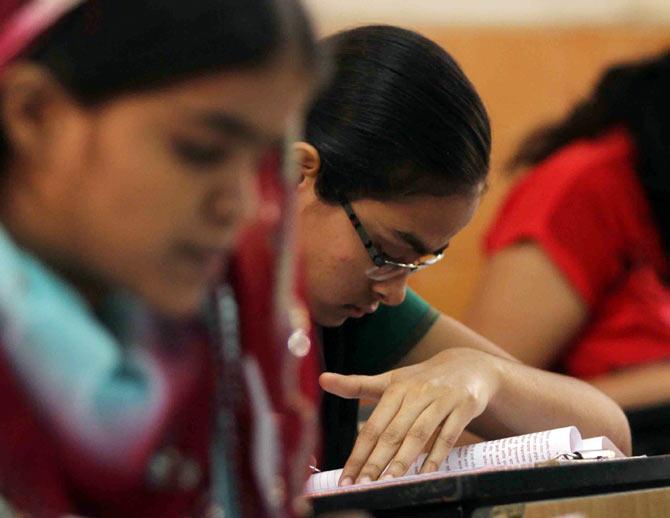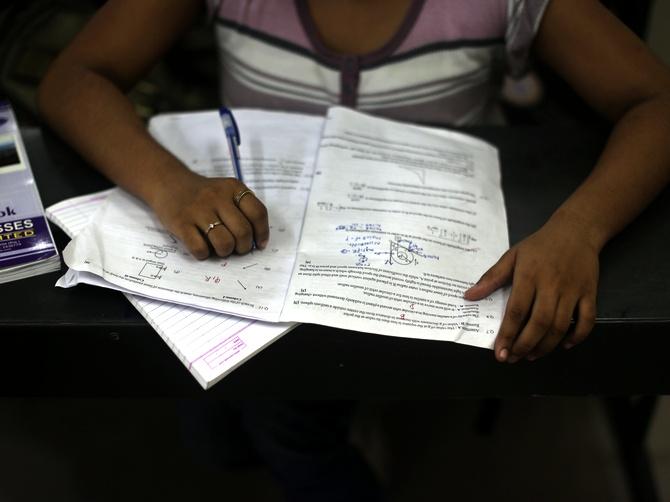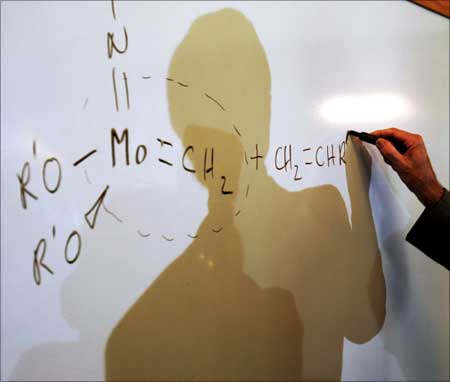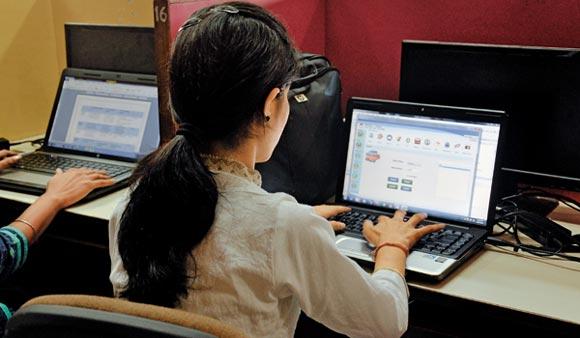 | « Back to article | Print this article |
Expert tips to crack the IIT-JEE Advanced
Ramesh Batlish, expert FIIT JEE, Noida tells you how you can ace the most difficult engineering entrance exam by following a systematic study plan.
The JEE (Advanced), formerly known as the IIT-Joint Entrance Exam, is an annual college entrance examination of the Indian Institutes of Technology in India.
It is also one of the toughest engineering entrance exams in the world.
About 1.5 lakh students will be shortlisted from the JEE (Main) to appear for the JEE (Advanced) 2014 on Sunday, May 25, 2014.
A serious aspirant ideally must have completed the syllabus by now.
The schedule of JEE (Advanced)-2014 is as follows:
Paper 1: 9 am to 12 noon IST
Paper 2: 2 pm to 5 pm IST
The syllabus
Syllabus of Classes XI and XII contributes about 45 percent and 55 per cent of the IIT-JEE question-papers respectively.
While preparing all the chapters of Physics, Chemistry and Mathematics, based on our past experience stress may be given in particular on the following topics:
Mathematics: Quadratic Equations and Expressions, Complex Numbers, Probability, Vectors and 3D Geometry, Matrices in Algebra; Circle, Parabola, Hyperbola in Coordinate Geometry; Functions, Limits, Continuity and Differentiability, Application of Derivatives, Definite Integral in Calculus.
Physics: Mechanics, Fluids, Heat and Thermodynamics, Waves and Sound, Capacitors & Electrostatics, Magnetics, Electromagnetic Induction, Optics and Modern Physics.
Chemistry: Qualitative Analysis, Coordination Chemistry & Chemical Bonding in Inorganic Chemistry, Electrochemistry, Thermodynamics, Chemical Equilibrium in Physical Chemistry and Organic Chemistry.
The paper pattern
There will be two question papers, each of three hours duration.
Both the question papers will consist of three separate sections on Chemistry, Physics and Mathematics.
They will be of objective type, designed to test comprehension, reasoning and analytical ability of the candidates.
All questions will have multiple choices (MCQ or Multiple Choice Question).
Negative marking scheme will be followed in the checking of examinations.
You can opt for a question paper in English or Hindi.
The author Ramesh Batlish is head of FIITJEE Noida, a private coaching institute that trains students for competitive engineering entrance exams in the country.
Please click NEXT to continue reading...
Tips to crack JEE (Advanced) Mathematics
Previous JEE papers suggest that more attention should be paid to topics like Vectors and 3-D than Probability or Indefinite integration as vectors and 3-D offers very less scope to examiner, as far as variety in problem is concerned.
One more chapter you must focus on is Complex Numbers; every year two to three problems (of purely complex number) are asked. Hence mastering complex numbers, vectors, 3-D and Definite integral must be on top priority.
Algebra can be made easier if you have the ability to picture functions as graphs and are good at applying vertical and horizontal origin shifts carefully as zeroes of functions and other specific values can be done in much less time using these techniques.
Differential calculus again relates well to roots of equations, especially if you use the Rolle's and Lagrange's theorems.
Complex numbers can be used to solve questions in co- ordinate geometry too. Trigonometric questions require applications of De Moivre's theorem.
Permutation-Combination and Probability is another very important topic in algebra.
You need to be thorough with the basics of Bayes theorem, derangements and various ways of distribution, taking care of cases where objects are identical and when they are not.
Matrices can be related to equations, hence a 3x3 matrix can actually be visualised as being three-planed in 3D geometry.
Determinants have some very nice properties, for instance, the ability to break them into two using a common summand from a row/ column, which should be made use of in tougher questions.
Integral calculus can be simplified using tricks and keeping in mind some basic varieties of integrable functions. Remembering the properties and applying them wisely saves lot of time.
Coordinate geometry requires a good working knowledge of the parametric forms of various conic sections and an ability to convert the other, tougher ones to these basic forms and then interpret the solutions accordingly.
Finally the only one way to do well in Mathematics is to practice problems keeping in mind the pattern of questions in the previous years' JEE papers.
Please click NEXT to continue reading...
Tips to crack JEE (Advanced) Chemistry
Conceptual clarity, application skills and awareness to the prescribed syllabus should be the main focus.
Practice the most relevant numerical daily to develop speed. Pay special attention to the topics like Mole concept, Chemical Equilibrium and Electrochemistry.
Take a careful and patient approach for Organic Chemistry giving particular attention to the topics like Stereochemistry, GOC (General Organic Chemistry) and Functional Group Analysis.
In Inorganic chemistry most of the questions which are asked are really conceptual, concerned with structures, processes and applications.
Special attention is a must to the topics like Chemical Bonding and Coordination Chemistry.
Please click NEXT to continue reading...
Tips to crack JEE (Advanced) Physics
Mechanics is one topic in Physics that is considered less scoring by most experts.
However to add to the dilemma this is also the topic that forms the major portion of the JEE (Advanced) in terms of marks. So this topic cannot be neglected.
One must also try to concentrate on other scoring topics to ensure a better performance, for example Optics, Electricity and Magnetism, etc.
Kinematics and Particle dynamics are very important topics of Mechanics that make regular appearance in the JEE papers.
According to the general trends, Mechanics and Electricity and Magnetism are the most important topics in terms of the number of questions asked in the JEE of previous years.
I have listed these topics in the decreasing order of the marks they carry based on their appearance in previous years' papers.
- Mechanics and Electricity and Magnetism (Equal importance)
- Modern Physics
- Optics
- Heat and Thermodynamics and Waves and Sound
- Measurement and errors
Thermodynamics is important from the terms of both Physics and Chemistry so concentrate on that as well.
It is wise to cover Wave Optics first in 'Optics' topic. The reason is that the portion is smaller compared to Ray Optics thus quick to cover.
Please click NEXT to continue reading...
Some more tips to help you crack the JEE 2014
- Stay focussed and maintain a positive attitude.
- Develop speed. Refer to reputed mock-test series to build a winning exam temperament. Solve the past year's IIT-JEE papers. Focus on your weak areas and improve upon your concepts.
- Practise of JEE level questions is necessary as it improves your reasoning and analytical ability.
- Remember it is quality of time spent and not the quantity alone that matters. Take short breaks of five to 10 minutes every one to two hours of serious study. It is important to relax. Practice meditation to develop inner calm, poise, confidence and power of concentration.
- Don't overstress yourself. Five to six hours of sleep every night is a must, especially three to four days before the main exam to keep you physically and mentally fit. While short naps may help to regain freshness, avoid over-sleeping during the day.
If you find the paper tough, don't be nervous. It is the relative performance that counts. So put your best analytical mind to work, and believe in your preparation. Good luck!




